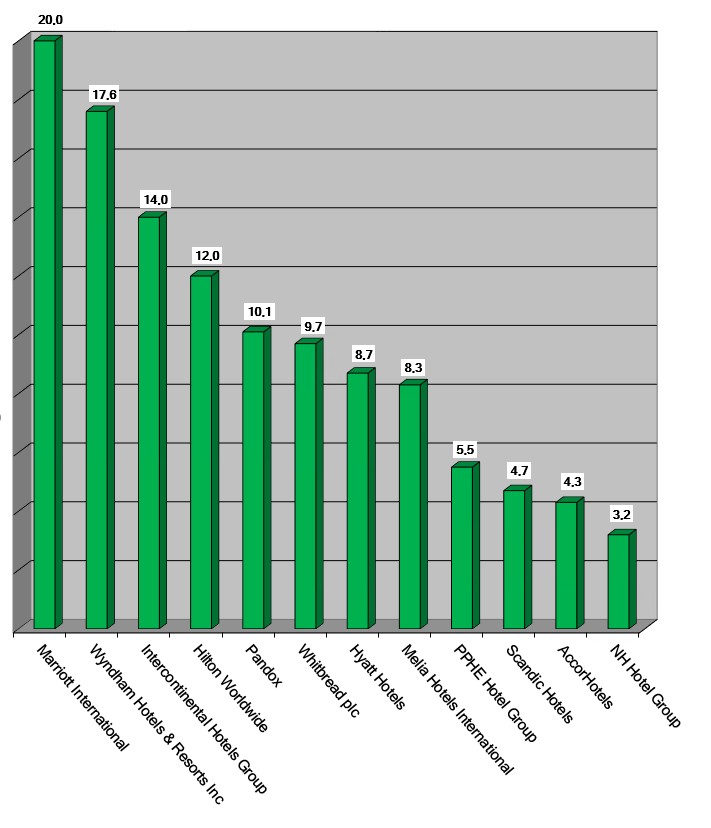HI+Share price performance of the week 23/04/20 - 29/04/20
Changes compared to the previous week in %.


Munich. Hotel properties have become presentable. Germany's hotel investment market, regarded as a "safe haven", is heading for a new record result of three billion euros. However, especially the vast amounts of cheap money provided by the central bank lead to massive increases in property prices while the number of available properties decreases at the same time. And the number of investors, which are new to the industry, is increasing too. This, in combination with higher risk-taking, is not a good precondition for long-lasting and sustainable investments! At least this was the opinion of experienced hotel experts taking part in the panel discussion at Expo Real's hotel conference in Munich last week. They criticised the current, unhealthy situation in the market and see different solutions to this dilemma. However, without knowledge of the hotel industry, failure seems inevitable.
Munich. Earning money with hotels sounds good, and even a bit sexy. The appeal of the hotel as an asset class is high, especially as it's often subconsciously associated with the luxury, travel and holiday - positive terms to which office and residential properties can't lay claim. But this has little to do with reality. Hotel real estate is operator real estate. The demands on investors are therefore high. All the same, their hunger for hotels is large. Especially popular are hotel funds. And it looks like the relationship between funds and hotels is becoming ever closer. A current look at the funds scene with the old and the newcomers.
Cagliari. The facts are simple: Following a decision of the European Union Commission in 2008, a recent judgment of the civil tribunal of Cagliari, the administrative centre of the island, is forcing 30 Sardinian hoteliers to return regional funding in a total amount of 35 million euros, interest and penalties included. A severe sanction that could threaten the existence of many of the properties involved, from 3- to 5-star hotels, along with their more than 1,500 employees, almost 9,000 beds and a total yearly turnover of about 60 million Euros, according to the local hospitality association, Federalberghi Sardegna. The story, however, is rather complex and quite grotesque.
Larnaca/Paris. Since last autumn, one company on the German hotel finance landscape in particular has undergone a remarkable change. Until October 31, 2014, it was privately run. Then, Yakir Gabay quietly had his hotel holding company, Primecity Investment, listed on the Paris Stock Exchange. The move meant he immediately acquired a strong capital base from which to drive forward a lightening-quick cash-driven expansion. Over night, the investor had EUR 150 million at his disposal; EUR 100 million from the IPO in October 2014 and a further EUR 50 million from a convertible bond issued in February 2015. Philipp von Bodman, CEO of Primecity Investment Plc, on the new asset profile, the new investment drive and the more comprehensive operator strategy.
Seefeld/Bad Gastein. The 5-star For Friends spa hotel in Moesern near Seefeld, Austria, achieved a record-breaking insolvency. Not even a single year passed between the opening of the hotel and insolvency proceedings. Now, the spa hotel is to be closed. Another insolvency has been arising from the culmination of many years full of wrong decisions revolving around the famous Hotel Village Gruener Baum in Bad Gastein.
Davos. The engagement with the "Golden Egg" in Davos has not turned out to be a lucky find for the InterContinental Hotel Group up to now. With the execution of the tenant's bankruptcy, they must now forego cash.
Berlin. The environment is changing slowly but steadily for the hotel industry at ITB. The world's largest tourism trade show, which ended with the consumers' days last Sunday in Berlin, recorded growing numbers again. This was not always noticeable at the "hotel hall" 9. However, noticeable and visible everywhere: just like the tentacles of an octopus, the number of eCommerce and technology exhibitors is increasing and spreading out to more halls now. In general, the exhibitors registered that the majority of trade visitors clocked their appointments mainly between Wednesday noon and Thursday evening. Therefore, on Friday, hall 9 seemed to be less frequented than in the previous years.
Berlin. There are enough flashpoints in the world, yet despite all of these, the hospitality sector together with its investors at this year's International Hotel Investor Forum shows itself to be in extremely positive almost "dangerously" good mood. Money is flowing, lots of money, and more than a billion guests per year travel, and the trend is rising... And with all of these, many of the current gyrations are having precious little impact. In terms of hotel real estate, Europe appears pretty much to be comprised Germany alone. And even where there are problems at the moment, in Russia for instance, the sector expects the difficulties to soon pass. Why are they so super optimistic and where do they have at least a little cause for concern?
Munich. There's more than enough money! Since last year, this sentence has been heard often, also among hotel developers. Above all institutional investors stand under pressure to invest: Their capital experts manage billion euro sums: Alone the German insurance industry needs to securely invest millions of euros every day and in so doing generate a return. In the current environment, this is anything but easy. After all, the low interest phase in Europe and the US will not change in the near future - nor will the short supply of core properties on the real estate market. In order to meet their real return expectations, insurance companies, pension funds and sovereign wealth funds are increasingly on the look out for new business fields and asset classes. Renewable energies, infrastructure, but also niche assets such as project developments, residential property and hotels are becoming increasingly interesting. Often though, this introduces risk into the game.
Munich/London. The real estate investment company of Invesco Real Estate is carefully entering the world of hospitality. In 2006, the company launched its initial fund revolving around hotels, the classic special real estate type. In November 2014, the company was seemingly overcome by boldness investing in the small Generator Hostels group. This gave the industry a jolt. Low-budget investments in the world of conservatives? Invesco, however, plans to open up even further, opportunistically investing in hotel niches and niche providers on a pan-European level, says Marc Socker, Senior Director Fund Management Hotel at IRE.